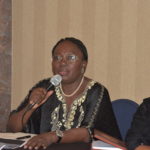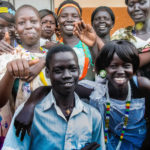For the last 10 days, over 20,000 delegates from 200 countries have been at the Glasgow Climate Conference in Scotland, discussing ways to keep climate change under control. This global discourse around climate change points towards one fact; we are in a climate emergency and researchers say that we have seven years to fix it before it is too late.
One of the world’s most pressing concerns is how to stay beneath the carbon budget, which refers to how much carbon dioxide countries can release into the atmosphere before the world is guaranteed to warm at least 1.5 degrees Celsius as set by the goals of the Paris climate agreement.
Although Uganda has an average footprint that amounts to about 0.1 per year according to World in Data, 2017. The country still experiences the effects of climate change as well. Today, our average temperatures have increased by 1.3°C with maximum temperatures increasing by 0.6–0.9°C.18. The volume and frequency of rainfall have also been affected.
According to data from the Climate Risk Profile, Uganda has experienced a statistically significant reduction in annual as well as seasonal rainfall with decreases of 6.0 mm per month, per decade. This decline in rainfall has been observed in some northern districts; Gulu, Kitgum, and Kotido. The decreasing rainfall has been followed by longer periods of drought. Specifically, over the past 20 years, the western, northern and northeastern regions have experienced more frequent and longer-lasting drought conditions.
With climate change becoming a serious threat to the lives of billions of people and the planet, Uganda today joins the rest of the world to mark the 20th edition of World Science Day for Peace and Development to highlight the importance of “Building Climate-Ready Communities”. The focus for this year’s celebration is to see how we can bring science closer to society by highlighting some key scientific aspects and possible solutions provided by science, technology and innovation to help resolve some of the major global challenges’ society is facing today.
Ancel Ochino Bwire, business adviser of Uganda Green Enterprise Finance Association (UGEFA), believes that the solution to climate change is in the creation and support of Green businesses and since 2020, this is what UGEFA have been working towards.
UGEFA is a Ugandan initiative funded by the European Union and implemented by ADELPHI and Finding XY. Its primary focus is working towards transitioning sustainably to a green economy.
According to Bwire, the initiative which started in 2020, was inspired by the urgency of the climate crisis which requires as many if not all hands-on boards to mitigate. Towards this goal, UGEFA with the help of the European Union took on the task of supporting the creation of scalable climate-conscious businesses through capacity building and co-creation with financial institutions to facilitate access to tailored missing middle finance.
“We have 83 green companies going through the accelerator program. The companies are in the categories of eco-tourism, clean energy, sustainable transport, waste management and green manufacturing and agro-processing,” Bwire says.
Elvis Kadhama, Founder of Pearl Entrepreneurs Academy Ltd (PEAL) and UGEFA supports Green businesses, is providing a holistic last-mile solution to socio-economic and environmental challenges faced by low-income communities through giving them access to clean energy.
Kadhama’s green cause springs from a tragic experience, where his friend lost two daughters in a kerosene lamp induced fire that torched their house. Since then, Kadhama has made it his cause to supply safe and sustainable energy equipment to rural communities that live off the grid of electricity. Through a friendly payment plan, PEAL supplies a range of products that reduce the emission of pollutants into the atmosphere. The products include Solar lamps that are substituted for Kerosene lamps, Energy-saving cooking stoves that are smoke-less, Solar home systems and water filters.
“By adopting sustainable and clean energy, low-income households save an average of two to four dollars per week which are spent on kerosene. These interventions also reduce the costs of firewood as well as the rate at which trees are cut down for fuel thanks to the use of cost-effective cooking stoves and water filters. He hopes that the fight against climate change can be a concerted effort.”
Samantha Niyonsaba Karama, Future Lab Lead at The Innovation Village says building climate-ready communities is work that requires efforts from every stakeholder in the ecosystem. She commends the crucial role that science plays in illuminating the crisis at hand by providing data on the status quo while also providing solutions countering the crisis.
Niyonsaba added, “We know that the need for a green economy is urgent because of scientific research and empirical evidence. To address the issue of climate change and build better-prepared communities, through our Energy-tech lab, we provide support and mentorship to entrepreneurs creating frugal environmental innovations that have resulted into groundbreaking technologies that have helped individuals and communities to slow down climate change.”
“We also fund and work with Ecoplastile, a company that is reducing plastic waste and combating deforestation through the recycling of plastic waste to create Plastic Timber and pavers. It is only through this collaboration, combining the private sector, innovators, technology, and the public sector that communities can be supported as they transition into being environmentally conscious and climate change combative livelihoods,” Niyonsaba emphasized.
As we celebrate the World Science Day for Peace and Development today and the climate conference concludes this Friday, there is a need to empower communities with information and innovative solutions that can enable them to reduce their carbon footprint and contribute towards the conservation and preservation of the earth.








